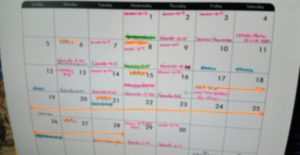 I like my schedules. Whenever we change the clocks, I don’t feel right for days. This week, my daughter woke up at 4:45 AM Monday with a cold and fever, and didn’t go back to sleep. Monday lasted for about 2 days. Plus, since she didn’t go to school, it messed up my weekly work schedule. Finally, Wednesday was the last day of school this week, so I spent the day thinking it was Friday.
I like my schedules. Whenever we change the clocks, I don’t feel right for days. This week, my daughter woke up at 4:45 AM Monday with a cold and fever, and didn’t go back to sleep. Monday lasted for about 2 days. Plus, since she didn’t go to school, it messed up my weekly work schedule. Finally, Wednesday was the last day of school this week, so I spent the day thinking it was Friday.
Humans are creatures of habit. A million little things can derail our comfortable routines. When anything knocks us off the rails, it can make us irritable or anxious or leave us feeling unfocused.
This got me thinking about our characters. They have their routines, too. Having something disrupt their day is a great way to add tension great and small.
Not getting their morning coffee can make them angry, which perhaps makes them mishandled a situation, which leads to further unhappy consequences. A larger incident, such as a car accident, can change their whole world.
Inciting incidents are the ultimate shakeup of our character’s schedule. It alters their world in such a way that they can never go back to their comfortable cocoon.
The one that comes immediately to mind is from Star Wars: A New Hope. Luke Skywalker’s routine is broken when he has to hunt down runaway R2D2. As a result, he is not home when the stormtroopers murdered his family. With nothing left to keep him on Tatooine, he embarks on his adventure to the stars.
Knowing how discombobulated even a minor change in schedule leaves me, I want to make sure my characters display a similar disorientation in proportion with the incident they are facing. Too often protagonists seem to take such shakeup in stride, which makes them less realistic and less relatable. So I want to work on that in my characters.
Meanwhile, I am waiting for my internal clock to readjust.

